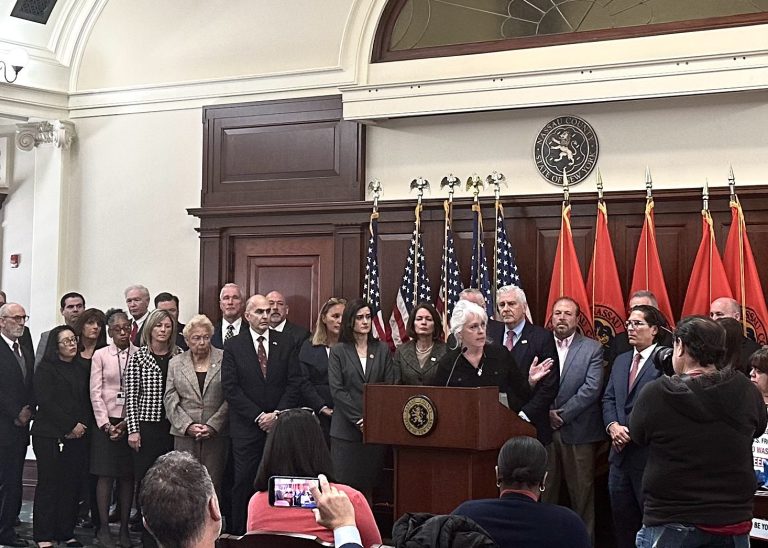
Carole Trottere described her son Alex Sutton as a funny person who was a wonderful friend to so many people. He was a licensed welder who loved his career and was just getting ready to start a new job in Illinois when he died of a fentanyl overdose in April 2018 at the age of 30.
In the wake of her son’s death, Trottere told Blank Slate she felt as though she had lost her purpose. After nearly five years of grieving, she said she has found that purpose again through the overdose prevention advocacy work she now does.
Trottere spoke at a press conference Monday where County Executive Bruce Blakeman announced the county’s implementation of Narcan kits, a life-saving overdose reversal drug, in 50 locations throughout the county. The Narcan kits will be placed in automatic defibrillator kits throughout the county.
Trottere, a longtime press secretary for legislative leads and the Nassau County comptroller, said she aided in establishing this.
In 2021, 270 overdose-related deaths were reported in Nassau County. Of those deaths, 190 were due to fentanyl, according to Blakeman.
While the 2022 data is not complete yet, Blakeman said that 172 overdose deaths have been reported in 2022 so far. He attributed the apparent decrease in overdose deaths to more access to Narcan throughout the county.
“The job’s not done until it’s zero,” Blakeman said.
He added that six out of 10 illegal pills the Drug Enforcement Agency tested this year contained enough fentanyl to kill a human being and fentanyl overdoses are the leading cause of death for those ages 18 to 45.
“This kind of drug doesn’t discriminate based on race, based on ethnicity, based on what their religion is, based on what their socio-economic status is,” Blakeman said. “This is a drug that’s insidious and it’s in every neighborhood and every community and we’ve got to fight it.”
The implementation of the Narcan kits was achieved through a partnership between the county and the Long Island Council on Alcoholism and Drug Dependence. LICADD is an organization that originated in Nassau County which provides services to combat issues related to alcohol and drug abuse.
Blakeman announced in September that the county is investing $2.4 million in drug treatment, education and prevention with the money they received through the opioid settlement between the state of New York and three of the nation’s largest drug distributors.
Blakeman said during Monday’s press conference that his office and the Legislature will be spending $15 million a year over the next four years for overdose prevention, drug treatment and education, which he announced in September. He said there is a meeting scheduled this month in which they will finalize the plans for how the money will be dispersed.
Blakeman said the decision for how the money will be distributed is taking a while as they are researching where the money can go for the best results. Distribution of the money should be done “very quickly,” he said, but did not provide an exact date, timeline or numbers as to how and where it will be divvied up.
Trottere said that the county’s implementation of Narcan kits is a step in the right direction for overdose death prevention in the county.
“Is this world changing? No, but what the county executive did today because I went in and asked him, I think that makes a little difference and I felt like that was good use of my purpose,” Trottere said. “I have a little more purpose now.”
As her son’s death nears the five-year anniversary, she said during most of the interim she didn’t think much about engaging in overdose prevention advocacy. Not until last fall when she attended a DEA summit in New York City for parents who had lost a child to substance use. She said the purpose of the summit was for the administration to speak with grieving parents and recruit them for drug education and awareness purposes.
To this day she’s unaware of how she got the email inviting her attend, but she described it as divine intervention.
“I really felt my son was guiding me when I was ready to do it,” Trottere said.
As Sutton was her only child, she said she felt like she had lost a part of her identity, questioning who she was and her purpose. This was the worst part of the five years following her son’s death, she said.
But engaging in advocacy for overdose prevention and education brought her a sense of purpose again. Since she has a career in public relations, serving as the director of communications for the Nassau County Comptroller, Trottere said this opportunity felt like something she could do.
Her biggest piece of advice for parents is to have the conversation about drugs with their kids. Regardless of who their child is and the activities they engage in, she said that this is an issue that has the potential to affect anyone, even the “good kids.”
“This is something you should talk to your children about, even if you think ‘I never have to worry about my kid touching an illegal drug.’” Trottere said. “It’s a dangerous world now for young people.”
She said what drives her to continue this work is to prevent parents like her from experiencing the death of a child due to an overdose.
“If you could just spare one parent from going through what I have to live with now for the rest of my life, then we’ve done a good deed,” Trottere said.






